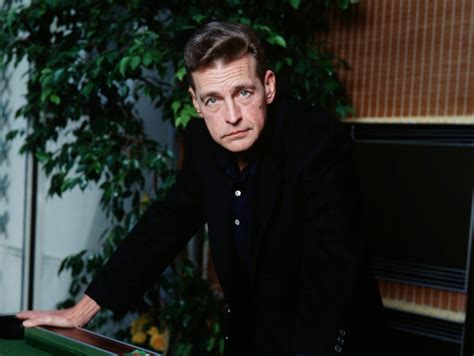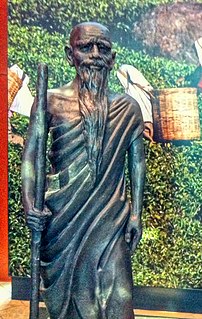A Quote by Sathya Sai Baba
Eating meat and drinking liquor are demonic vices. Those indulging in drink lose all sense of propriety, have no compassion or love and become demons.
Related Quotes
To avoid causing terror to living beings, let the disciple refrain from eating meat... the food of the wise is that which is consumed by the sadhus [holymen]; it does not consist of meat... There may be some foolish people in the future who will say that I permitted meat-eating and that I partook of meat myself, but... meat-eating I have not permitted to anyone, I do not permit, I will not permit meat-eating in any form, in any manner and in any place; it is unconditionally prohibited for all.
In fact, we would know ourselves that we are not meant to be meat eaters, and we would not have allowed ourselves to become conditioned to meat eating in the first place, if the effects of meat eating were felt right away. But since heart disease, cancer, diabetes, osteoporosis, etc. usually take many years to develop, we are able to separate them from their cause (or contributing factors) and go on happily eating an animal-based diet.
I don't know if enjoy is the right word for alcohol. I like to drink, but I don't like enforced social drinking. When I don't wanna drink, I don't wanna drink. I haven't had a desire to drink for four months. When I think of the taste of it, no desire. The trouble is the wines I love I can barely afford, which is a great method to cut down on your drinking: Drink only what you can't afford.
What is love? It is not simply compassion, not simply kindness. In compassion there are two: the one who suffers and the one who feels compassion. In kindness there are two: the one who gives and the one who receives. But in love there is only one; the two join, unite, become inseparable. The I and the you vanish. To love means to lose oneself in the beloved.
A prince must be prudent enough to know how to escape the bad reputation of those vices that would lose the state for him, and must protect himself from those that will not lose it for him, if this is possible; but if he cannot, he need not concern himself unduly if he ignores these less serious vices.
While self-interest arising from the enjoyment of meat eating is obviously one reason for its entrenchment, and inertia another, a process of language usage engulfs discussions about meat by constructing the discourse in such a way that these issues need never be addressed. Language distances us from the reality of meat eating, thus reinforcing the symbolic meaning of meat eating, a symbolic meaning that is intrinsically patriarchal and male-oriented. Meat becomes a symbol for what is not seen but is always there--patriarchal control of animals and of language.
If you like eating meat but want to eat ethically, this is the book for you. From the hard-headed, clear-eyed, and sympathetic perspective of butchers who care deeply about the animals whose parts they sell, the customers who buy their meats, and the pleasures of eating, this book has much to teach. It’s an instant classic, making it clear why meat is part of the food revolution. I see it as the new Bible of meat aficionados and worth reading by all food lovers, meat-eating and not.
[When we drop our agendas] we begin to cultivate a mind of true goodness and compassion, which comes out of a concern for the Whole. As we live out of such a mind, we become generous, with no sense of giving or of making a sacrifice. We become open, with no sense of tolerance. We become patient, with no sense of putting up with anything. We become compassionate, with no sense of separation. And we become wise, with no sense of having to straighten anyone out.
The inhabitants are numerous and happy... Throuhout the country the people do not kill any living creature, nor drink intoxicating liquor, they do not keep pigs and fowl, and do not sell live cattle; in the markets there are no butcher shops and no dealers in intoxicating drink... Only the Chandalas (lowest cast) are fisherman and hunters and sell flesh meat.









































